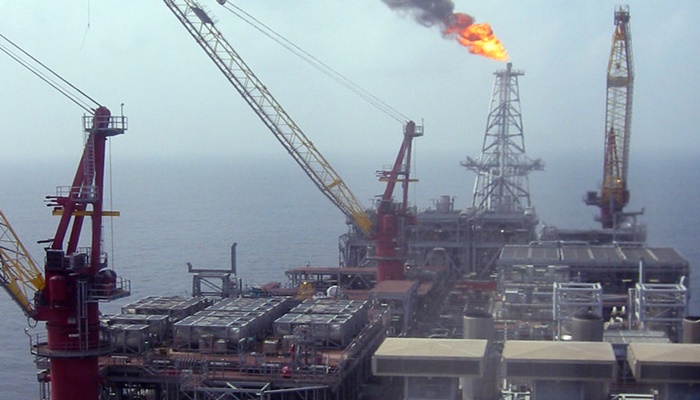
Shell, which operates facilities like this one, in the Bonga oil field off Nigeria’s coast, is entangled in a bribery investigation centered on a 2011 deal.
Just hours after the Dutch police raided the offices of Royal Dutch Shell last year as part of an investigation into a controversial $1.3 billion Nigerian oil deal, Ben van Beurden, the chief executive of the oil giant, placed a worried call to its chief financial officer.
The investigators were “quite forceful and brusque” and “rattled a few people,” Mr. van Beurden told the finance chief at the time, Simon Henry, when Mr. Henry returned his call. But Mr. van Beurden said he was also worried about something else: Shell’s own investigators had discovered internal emails that could cast the company in an even more negative light and widen the investigation by drawing in the United States law enforcement authorities.
In what he called “loose chatter,” Mr. van Beurden told Mr. Henry — who had been on leave — that the emails among employees contained language like, “I wonder who gets a payoff here.”
“I haven’t seen them,” Mr. van Beurden told Mr. Henry, “but apparently they were judged to be, y’know, just pub talk in emails, which was stupid, but nevertheless, it’s there.”
The call was recorded and has now been made public, offering a rare window into the murky and intrigue-filled business of international oil dealing. The recording and other aspects of the investigation show a world involving onetime British intelligence operatives and payments made to a former Nigerian oil official to complete a deal.
The recording, which was reviewed by The New York Times, was earlier reported on Sunday by BuzzFeed and Il Sole 24 Ore, an Italian newspaper. A spokesman for Shell, Andy Norman, did not dispute the authenticity of the recording.
Shell’s worries revolve around a deal in 2011 in which the Anglo-Dutch giant and Eni, the Italian oil company, paid about $1.3 billion to secure a coveted and contested license tract known as OPL 245 in the Atlantic Ocean off Nigeria that is believed to contain large quantities of oil.
Since 2014, Italian prosecutors have been investigating whether the money Shell and Eni paid was used to pay off Nigerian officials and whether the companies knew those payoffs would take place.
On Monday, Shell said that it knew that some of the money paid to the Nigerian government would be passed on to a company called Malabu Oil and Gas, which claimed the same tract. In an unrelated 2012 civil suit in New York against Malabu, court documents said Malabu’s principal was Dan Etete, a former Nigerian oil minister.
On Monday, Mr. Norman, the spokesman for Shell, said in an email that the company assumed it had no choice but to come to a sort of deal with Mr. Etete and Malabu.
DealBook delivers the news driving the markets and the conversation. Delivered weekday mornings and afternoons.
“Over time, it became clear to us that Etete was involved in Malabu and that the only way to resolve the impasse through a negotiated settlement was to engage with Etete and Malabu, whether we liked it or not,” he wrote, adding that Shell knew that the Nigerian government “would compensate Malabu to settle its claim on the block.”
Still, Mr. Norman said, “we believe that the settlement was a fully legal transaction” with the government of Nigeria.
In a statement on Sunday, Shell said that if it turned out improper payments were made by Malabu or others, “it is Shell’s position that none of those payments were made with its knowledge.” Shell also said it believed that there was no basis to prosecute the company or any current or former employees.
Eni has said an internal investigation found no wrongdoing.
In the phone call, Mr. van Beurden expressed worries that the internal emails Shell’s investigators had uncovered could draw the attention of the United States Justice Department. In particular, he cited emails written by former members of the British spy agency known as MI6 that Shell had hired. American officials have a reputation for being tough on international bribery cases.
Shell should have been “more open with the D.O.J. than we now find we have been,” he said.
Mr. Norman said that Shell had informed the Justice Department and the Securities and Exchange Commission of the aid and the results of an internal investigation conducted by the law firm Debevoise and Plimpton.
Eni has also faced pressure. Italian prosecutors recently recommended that the two oil companies and officials at Eni, including Claudio Descalzi, its chief executive, stand trial in the case. A judge is expected to decide this year whether a trial will occur.
The Eni board has expressed its “total confidence” that neither the company nor Mr. Descalzi was involved in illicit conduct. He is expected to be appointed to a second term at the company’s annual general meeting on Thursday.
The oil deal is also the focus of an extensive report published on Monday by Global Witness, a nongovernmental organization based in London, and another organization called Finance Uncovered. In their report, the groups called for more detailed reporting requirements on payments made to governments.
“This would help to prevent companies from scheming with greedy government officials to get rich at the expense of ordinary people,” the report said.
Source: The New York Times.






